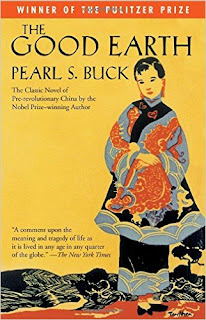The Good Earth by Pearl S. Buck
Rating: ***** 5/5 stars
Summary: Though more than seventy years have passed since this remarkable novel won the Pulitzer Prize, it has retained its popularity and become one of the great modern classics. In The Good Earth Pearl S. Buck paints an indelible portrait of China in the 1920s, when the last emperor reigned and the vast political and social upheavals of the twentieth century were but distant rumblings. This moving, classic story of the honest farmer Wang Lung and his selfless wife O-Lan is must reading for those who would fully appreciate the sweeping changes that have occurred in the lives of the Chinese people during the last century.
Nobel Prize winner Pearl S. Buck traces the whole cycle of life: its terrors, its passions, its ambitions and rewards. Her brilliant novel—beloved by millions of readers—is a universal tale of an ordinary family caught in the tide of history.
My Review: The Good Earth chronicles the story of farmer Wang Lung and his wife O-Lan. Wang Lung at the beginning of the book is about to marry O-Lan; he is 'getting her' from the rich house in his town/village. She is a slave there so she really is basically given and or sold to Wang Lung's Father as a bride for his son. The book follows their lives as they have children, go through famine and starvation, to when their luck seems to be on the upswing as they get older and are more settled and wealthy in their own right.
The language that this book was written at times could be a little off putting for example anytime a woman is mentioned in this book it is usually done with the word 'slave'. Thats how the men refer to them for sure; and most of the time women refer to themselves as 'slaves' also. I've never heard that term used for women in China but it doesn't surprise me too much because the story is set in the 1920's and now of course using that terminology would be considered prejudice against someone for the sex that they were born into. But in their society women were really considered to have the same value as cattle and their main goal in this society would have been to bear sons for their husbands and serve their husbands and their in-laws who they would most likely live with when they got married.
O-Lan really got to me as a character because you could tell by how she was described that she spent most of her early years as a slave and it seemed to have beat her down quite a bit. When it was described that her smile never reached her eyes and that it was almost torture to her to have to say more than a few words to somebody it HAD to have a lot to do with her early years in which she was regularly beaten and made to feel that she was less than dirt (in the story numerous times she is referred to as not good looking at all and kind of slow; that would've taken even more of her rights away because if you were beautiful you might make a good marriage or catch a rich men's eye to be his concubine; but this was not O-Lan's fate...she seemed to me as a reader to be very street-wise and she knew how to pinch pennies; make food go as far as possible; and when she was younger she even helped Wang-Lung with the harvest and worked the land with him. She always seemed to put others before herself and only really twice do I remember her getting really upset about something.
In both cases when she did get upset it was for a good reason and to me honestly it was kind of heartbreaking. She tried so hard to please her husband and take care of her family; and yet Wang Jung always seemed to be worried about himself. He was a great character but from a certain point on in the story I could not stand him because (for reasons I won't specify since you probably want to read it yourself) he did things that were SO selfish; and honestly it pissed me off because O-Lan has served him and given him sons her entire life; and he goes off and does something purely because he was bored and extremely selfish and in a way I felt that it really hastened O-Lan's death because he broke her heart.
The language in this book was enjoyable to me because it was something different; it was written so long ago and you can tell by how things are phrased in it that the author is not from our 2017 society; it was mainly refreshing; the only thing I never got used to was women always being referred to as 'slave' or 'slaves'. It felt strange to me but maybe that language/term for women in China was more common when this book was written.
It did not take me long to finish this book; it really pulled me into the story and was very hard to put down. I would DEFINITELY recommend it if your looking for something different/vintage that can keep your attention. It had a lot of life lessons and its not a book I'll soon forget.






